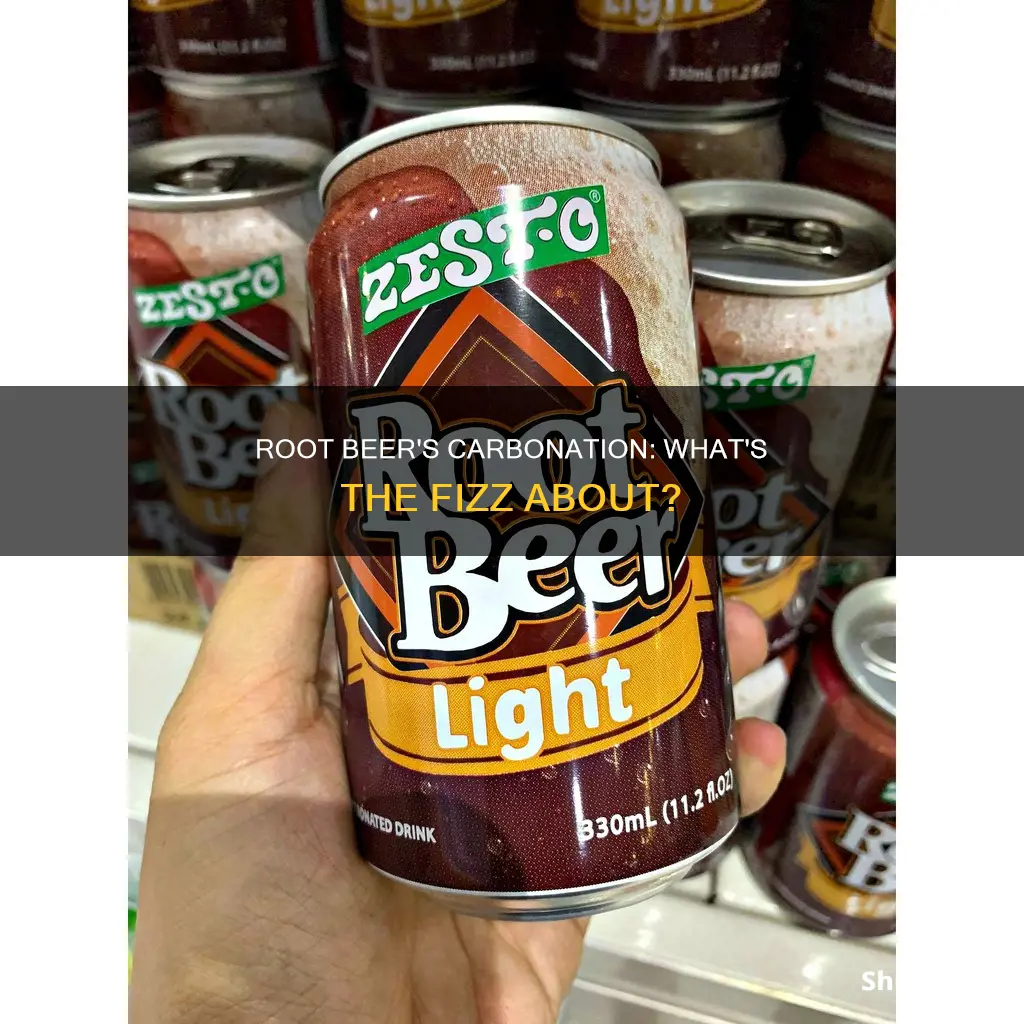
Root beer is a typically carbonated drink, although not all varieties are carbonated. It is a sweet, North American soft drink, usually non-alcoholic, caffeine-free, and characterised by its thick and foamy head. The drink is traditionally made using the root bark of the sassafras tree, which also lends its name to the beverage.
| Characteristics | Values |
|---|---|
| Carbonated | Yes, typically |
| Alcoholic | No, typically |
| Caffeinated | No, typically |
| Sweet | Yes |
| Thick | Yes |
| Foamy | Yes |
| Medicinal | Yes, historically |
| North American | Yes |
What You'll Learn

Is root beer alcoholic?
Root beer is a sweet, carbonated drink that has been around for centuries and has taken on many forms. It is typically non-alcoholic, caffeine-free, and sweet, but it can also be made as an alcoholic drink.
History of Root Beer
Root beer was originally made with the root bark of the sassafras tree or the vine of Smilax ornata (sarsaparilla). It was consumed by Native Americans for its medicinal properties and was also used by European settlers for the same purpose. In the 1800s, it was often consumed hot and combined with soda. It was also known as "root tea".
Commercial Production of Root Beer
In 1886, Charles Elmer Hires invented the commercial production of root beer and its artificial carbonation. This made the beverage more popular and paved the way for the non-alcoholic versions widely consumed today.
Alcoholic vs. Non-Alcoholic Root Beer
Most root beer varieties are non-alcoholic and can be enjoyed by anyone regardless of age. However, some traditional and modern root beers do contain alcohol.
Traditional root beer, made with the bark of the sassafras tree, has an alcohol content of about 2%. This is because the beverage was originally carbonated through fermentation, which produces alcohol as a by-product.
Modern alcoholic root beers are produced by craft and commercial breweries, with alcohol added to the drink. These alcoholic versions of root beer usually have an alcohol content of less than 5%. Examples include Small Town Brewery's Not Your Father's Root Beer, Hank's Root Beer, andsection Firkbrau Hard Root Beer.
How to Distinguish Between Alcoholic and Non-Alcoholic Root Beer
When purchasing root beer, it is essential to check the labels and indicators on the packaging. Alcoholic and non-alcoholic beverages have different labelling requirements under federal law. For example, in the United States, beverages containing more than 0.5% alcohol by volume (ABV) can only be purchased by individuals who are 21 or older.
Additionally, alcoholic beverage manufacturers must include government warnings about the potential risks associated with consuming their products.
Snail Solution: Beer Trap's Effectiveness and Efficiency
You may want to see also

Is root beer caffeinated?
Root beer is a popular soft drink, with a distinct sweet and herbal flavour. It is made from the root of the sassafras tree, along with herbs and sugar. It has a rich, creamy texture and is consumed worldwide.
So, is root beer caffeinated? The answer is: yes and no. Most modern root beers are caffeine-free, but some brands do contain caffeine.
Firstly, it is worth noting that root beer does not naturally contain caffeine. Caffeine is not a product of the root beer-making process. Therefore, if a root beer contains caffeine, it has been added during production.
If you want to avoid caffeine, most major brands of root beer, including A&W, Mug, Dad's, IBC, and Boylan, are caffeine-free. These brands are suitable for those wanting to limit their caffeine intake.
However, some root beer brands do contain caffeine. The most notable of these is Barq's, which contains 22 milligrams of caffeine per 12-ounce can. Interestingly, the diet version of Barq's is caffeine-free.
If you are unsure whether a root beer is caffeinated, you can check the ingredients list on the label. As caffeine is not a natural ingredient in root beer, it must be listed on the label if it is added.
In summary, while most root beers are caffeine-free, it is always a good idea to check the label if you are trying to avoid caffeine, as some brands do contain this stimulant.
Beer Drinking: How Much is Too Much for Daily Health?
You may want to see also

Is root beer healthy?
Root beer is a typically non-alcoholic, caffeine-free, sweet, and carbonated drink. While it is often marketed as a healthy beverage, it contains a lot of ingredients that make it an unhealthy option.
The drink is high in sugar, which can lead to weight gain and chronic conditions such as diabetes. Sugar can also erode tooth enamel, weaken teeth, and cause tooth decay. Some root beer brands also contain caffeine, which can cause insomnia, dehydration, and restlessness in high doses. Furthermore, the caramel colouring in root beer has been listed as a cancer-causing agent in California. While root beer was traditionally made from the root bark of the sassafras tree or vine of Smilax ornata (sarsaparilla), it is now made with artificial flavourings due to the cancer-causing properties of safrole, which was originally found in sassafras.
Despite this, some of the ingredients in root beer are thought to have health benefits. For example, in traditional herbal medicine, sassafras was used as a diuretic and to promote skin health, while sarsaparilla was used to beautify the complexion. Wintergreen leaf was used to prevent gas and ease digestion and nerve pain, and licorice root was used to ease digestive distress and treat ulcers. Other ingredients in homemade root beer, such as ginger, dandelion, hops, and birch, have also been used in traditional herbal medicine.
In conclusion, while root beer contains some ingredients with potential health benefits, it is high in sugar and may contain caffeine and artificial flavourings, making it an unhealthy choice overall if consumed regularly. Occasional consumption is acceptable, but drinking it more than a couple of times a week can lead to weight gain and other health problems.
Beer and Fever: Is There a Link?
You may want to see also

What is root beer made from?
Root beer is a sweet North American soft drink traditionally made using the root bark of the sassafras tree (*Sassafras albidum*) or the vine of *Smilax ornata* (known as sarsaparilla). Root beer is typically non-alcoholic, caffeine-free, sweet, and carbonated. It usually has a thick and foamy head, similar to that of beer.
The sassafras tree is native to the northeast coast of North America and some parts of East Asia. The bark and the root of the tree were brewed and combined with other beneficial herbs and roots like ginger, licorice, and cinnamon, and consumed for a variety of ailments. The drink was also used by European colonizers.
A traditional recipe for making root beer involves cooking a syrup from molasses and water, letting the syrup cool for three hours, and combining it with the root ingredients (including sassafras root, sassafras bark, and wintergreen). Yeast was then added, and the beverage was left to ferment for 12 hours, after which it was strained and rebottled for secondary fermentation. This recipe usually resulted in a beverage of 2% alcohol or less, although it could be modified to produce a more alcoholic beverage.
In 1960, the FDA banned the use of true sassafras in commercial products because the primary component, safrole, is carcinogenic. Modern root beer is usually made with artificial sassafras flavoring or the root or bark from a different plant.
Some common flavourings used in root beer include vanilla, caramel, wintergreen, black cherry bark, licorice root, sarsaparilla root, nutmeg, acacia, anise, molasses, cinnamon, sweet birch, and honey.
Beer and Gallstones: Is It Safe to Drink?
You may want to see also

Why is it called root beer?
Root beer is a sweet, carbonated soft drink that is typically non-alcoholic and caffeine-free. It is usually thick and foamy, with a brown colour and a distinctive flavour. But why is it called root beer?
The "root" in root beer refers to one of its primary ingredients: the root of the sassafras plant. The root is the primary source of the drink's flavour and aroma. The sassafras tree is native to most of the Eastern United States and was often used by Indigenous tribes for its medicinal properties. These practices were later adopted by European colonisers.
The "beer" part of the name comes from the use of yeast in the early production of root beer, which created carbonation and a small amount of alcohol, much like in traditional beer-making. While root beer is typically non-alcoholic today, you can still find ""hard" root beer with added alcohol.
The name "root beer" was likely also chosen for marketing purposes. The drink's creator, pharmacist Charles Elmer Hires, originally wanted to call it "root tea", but changed it to "root beer" to make it more appealing to the working class. The name change was a successful marketing strategy, and root beer soon became widely distributed across the United States.
Beer and Antibiotics: A Dangerous Mix?
You may want to see also
Frequently asked questions
Root beer is typically, but not always, carbonated.
Root beer was originally carbonated through fermentation, but as demand and technology changed, carbonated water was used instead. Modern root beer is force-carbonated or lightly fermented.
Root beer is typically non-alcoholic, but it can be alcoholic depending on how it's made. Root beer made through the traditional process contains about 2% alcohol, but "hard" root beers have more alcohol.
Root beer has a lot of ingredients that make it unhealthy, such as high-fructose corn syrup, caffeine, caramel, and artificial food flavourings. Consuming root beer occasionally is fine, but drinking it more than a couple of times a week can lead to health problems.
Root beer has a complex, warming, slightly spicy, and almost creamy flavour. It tastes like a combination of vanilla, cinnamon, caramel, and molasses.







